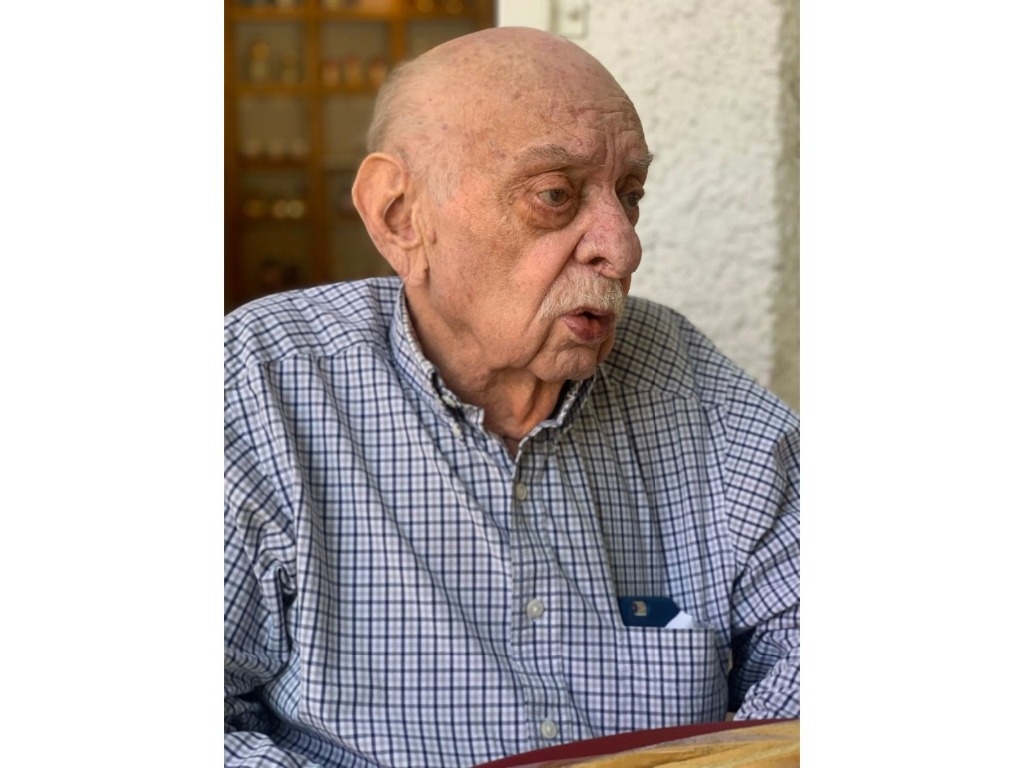Mexico City. The Polish exile has given Mexico great cultural contributions, for example the pianist Eva María Zuk, but there are also presences whose testimony is living history. This is the case of Bronislaw Weapons Zajbert, one of the few survivors of the Lódź ghetto in Poland.
At 91 years old, he calls on the world not to repeat the history of hatred and discrimination that occurred during World War II, when he and his family were locked up along with thousands of Jews massacred by Nazi hatred.
Weapons He was six years old in 1939. He was lucky to survive in the midst of the tragedy and today he lives in Mexico City.
In interview with The Day, calmly, says that humanity must eradicate hatred and discrimination from its hearts and actions, evils that destroy human dignity
.
He regretted the war conflicts in Ukraine and Palestine, and stressed that the first and second world wars began with conflicts in central Europe. The history of hate and discrimination must not be repeated
.
In the eyes of Weapons You can sense the sadness that he has carried for decades, since in his childhood he learned the horrors of war, but with great fortitude, at almost 91 years old, he maintains a lucid memory that remembers every detail of his experience in the Lódź ghetto.
With perfect Spanish he narrates that he learned this language when he was in Venezuela, where he was a refugee after the ravages of the war. His parents were León Zaibert and Hanna Herman, and his younger brother, Ignacio Zajbert, who remembers almost nothing from that time, because he was a baby.
We lived in a comfortable apartment in Lódź, everything that a place where you live comfortably has; I had my bedroom and a canary that they had given me, it was one of my possessions; The place was not luxurious, but it was comfortable
account.
Until one day when Nazi soldiers arrived at the door of their house and demanded that they leave immediately, take their essential things and leave the home. Get out, get out of here! Grab what you can and get out.
they ordered them.
At that time only his younger brother was at home, Weapons and her mother, who fortunately spoke German, and begged the soldiers to leave them one more day for her husband to arrive and then they would leave. She appealed for mercy by reminding the Germans that they too had families. The invaders, upon hearing the pleas in her language and seeing the white woman, with blue hair and eyes, answered that only one day and they should not take anything.
It was a terrible experience when they took us to the Lódź ghetto. My family was assigned to the kitchen of an apartment, while others occupied the other spaces; we were all jewish
. There the fearsome star was attached to their chest that identified them as belonging to the race that the Germans sought to exterminate. First I lost my canary, then my freedom; They locked us in the poorest and ugliest place in the city
he evokes.
In the ghetto, hatred began Weapons towards potato peelings, which was what I sometimes had to eat and in small portions.
During the confinement, he details, there was a local government within the ghetto, made up of the imprisoned Jews themselves. “They carried out raids, removing Jews from the poor houses and presenting them to the Nazis who asked for prisoners to transfer them ‘to other places’; back then, you didn’t know where the railroads they were put on went.”
Weapons – who now uses a wheelchair to get from one place to another – and his family were in Lódź for five years. One day they hid in an abandoned cabin to avoid being taken on trains; They went three days without food, but they saved their lives.
Of the nearly 200 thousand Jews who passed through Lódź, only 877 people left alive.
They were liberated by the Russians and Poles on January 19, 1945. I fainted from excitement and my dad revived me. After the long wait we were free and we were all together. The first thing I did was rip off the star I had on my chest; the hatred towards us was over
.
After the tragedy experienced in Poland ended, the family of Weapons He had the possibility of emigrating to Venezuela. Years later, he visited his uncle, who was a journalist in Mexico, where he met the young girl Zina Rapoport, who would later become his wife. It was when he decided to put down roots in this country.
The name of the pastry shop that the Zajbert couple founded is Zinazúcar, in memory of when they got married in 1960. The business specializes in baking for people with diabetes.
Before getting married, Weapons He studied chemical engineering at Wooster College, in Ohio, United States. In addition, he worked as production manager at the Adams chewing gum factory in Caracas. His family consists of a daughter who resides in San Diego, California, a son, three grandsons and three granddaughters, and three great-grandsons.
weapons, The lucky boy reiterated his call to human beings to respect their neighbors. We are all equal. We must banish hatred and discrimination in the world; there can be no one superior to anyone
expressed satisfaction at having a loving family and living in peace in Mexico.
#history #hate #repeated #ghetto #survivor
– 2024-05-01 06:54:59


